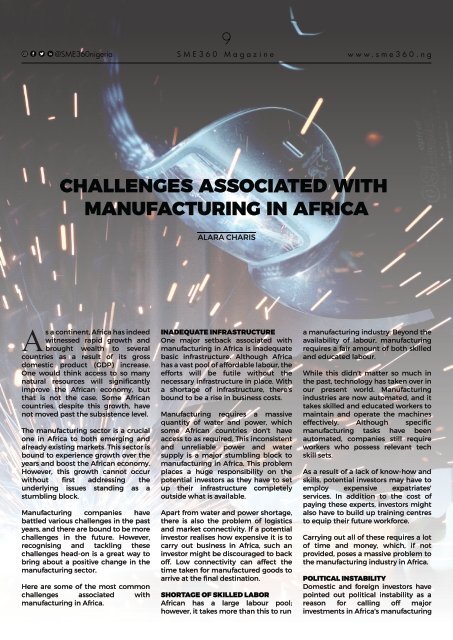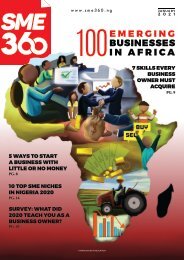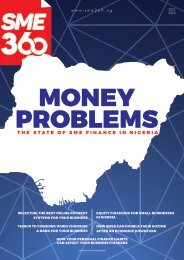FEBRUARY 2021 - MADE IN AFRICA ISSUE
You also want an ePaper? Increase the reach of your titles
YUMPU automatically turns print PDFs into web optimized ePapers that Google loves.
@SME360nigeria<br />
9<br />
SME360 Magazine<br />
www.sme360.ng<br />
CHALLENGES ASSOCIATED WITH<br />
MANUFACTUR<strong>IN</strong>G <strong>IN</strong> <strong>AFRICA</strong><br />
ALARA CHARIS<br />
s a continent, Africa has indeed<br />
witnessed rapid growth and<br />
brought wealth to several<br />
countries as a result of its gross<br />
domestic product (GDP) increase.<br />
One would think access to so many<br />
natural resources will significantly<br />
improve the African economy, but<br />
that is not the case. Some African<br />
countries, despite this growth, have<br />
not moved past the subsistence level.<br />
The manufacturing sector is a crucial<br />
one in Africa to both emerging and<br />
already existing markets. This sector is<br />
bound to experience growth over the<br />
years and boost the African economy.<br />
However, this growth cannot occur<br />
without first addressing the<br />
underlying issues standing as a<br />
stumbling block.<br />
Manufacturing companies have<br />
battled various challenges in the past<br />
years, and there are bound to be more<br />
challenges in the future. However,<br />
recognising and tackling these<br />
challenges head-on is a great way to<br />
bring about a positive change in the<br />
manufacturing sector.<br />
Here are some of the most common<br />
challenges associated with<br />
manufacturing in Africa.<br />
<strong>IN</strong>ADEQUATE <strong>IN</strong>FRASTRUCTURE<br />
One major setback associated with<br />
manufacturing in Africa is inadequate<br />
basic infrastructure. Although Africa<br />
has a vast pool of affordable labour, the<br />
efforts will be futile without the<br />
necessary infrastructure in place. With<br />
a shortage of infrastructure, there's<br />
bound to be a rise in business costs.<br />
Manufacturing requires a massive<br />
quantity of water and power, which<br />
some African countries don't have<br />
access to as required. This inconsistent<br />
and unreliable power and water<br />
supply is a major stumbling block to<br />
manufacturing in Africa. This problem<br />
places a huge responsibility on the<br />
potential investors as they have to set<br />
up their infrastructure completely<br />
outside what is available.<br />
Apart from water and power shortage,<br />
there is also the problem of logistics<br />
and market connectivity. If a potential<br />
investor realises how expensive it is to<br />
carry out business in Africa, such an<br />
investor might be discouraged to back<br />
off. Low connectivity can affect the<br />
time taken for manufactured goods to<br />
arrive at the final destination.<br />
SHORTAGE OF SKILLED LABOR<br />
African has a large labour pool;<br />
however, it takes more than this to run<br />
a manufacturing industry. Beyond the<br />
availability of labour, manufacturing<br />
requires a fair amount of both skilled<br />
and educated labour.<br />
While this didn't matter so much in<br />
the past, technology has taken over in<br />
our present world. Manufacturing<br />
industries are now automated, and it<br />
takes skilled and educated workers to<br />
maintain and operate the machines<br />
effectively. Although specific<br />
manufacturing tasks have been<br />
automated, companies still require<br />
workers who possess relevant tech<br />
skill sets.<br />
As a result of a lack of know-how and<br />
skills, potential investors may have to<br />
employ expensive expatriates'<br />
services. In addition to the cost of<br />
paying these experts, investors might<br />
also have to build up training centres<br />
to equip their future workforce.<br />
Carrying out all of these requires a lot<br />
of time and money, which, if not<br />
provided, poses a massive problem to<br />
the manufacturing industry in Africa.<br />
POLITICAL <strong>IN</strong>STABILITY<br />
Domestic and foreign investors have<br />
pointed out political instability as a<br />
reason for calling off major<br />
investments in Africa's manufacturing








